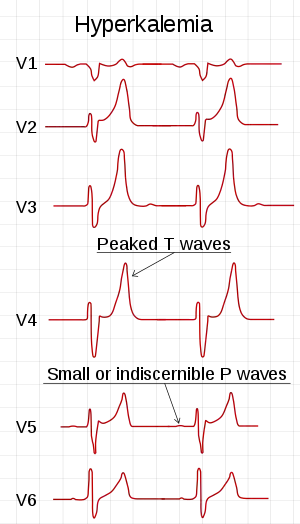Hyperkalemia
Hyperkalemia is a medical term to indicate that the level of potassium in the blood is too high. Depending on the level of potassium in the blood, this can be a medical emergency. A level that is too high can lead to abnormal hearth rhythms.
| Hyperkalemia | |
|---|---|
| Other names | Hyperkalaemia |
 | |
| Electrocardiography showing precordial leads in hyperkalemia. | |
| Pronunciation |
|
| Medical specialty | Critical care medicine, nephrology |
| Symptoms | Palpitations, muscle pain, muscle weakness, numbness[1][2] |
| Complications | Cardiac arrest[1][3] |
| Causes | Kidney failure, hypoaldosteronism, rhabdomyolysis, certain medications[1] |
| Diagnostic method | Blood potassium > 5.5 mmol/L, electrocardiogram[3][4] |
| Differential diagnosis | Pseudohyperkalemia[1][2] |
| Treatment | Medications, low potassium diet, hemodialysis[1] |
| Medication | Calcium gluconate, dextrose with insulin, salbutamol, sodium bicarbonate[1][3][5] |
| Frequency | ~2% (people in hospital)[2] |
Many medications can cause hyperkalemia, and it is much more likely to occur in people kidney problems.
Although hyperkalemia often doesn't cause symptoms, doctors worry about hyperkalemia because it can cause a sudden change of heart rhythm in people who had not been having any symptoms. These abnormal heart rhythms can be deadly.
In the cases where death penalty is carried out using lethal injection, a hyperkalemia may be provoked atificially. Some of the mixtures used in the injections contain potassium chloride which will raise the level of potassium in the blood considerably.